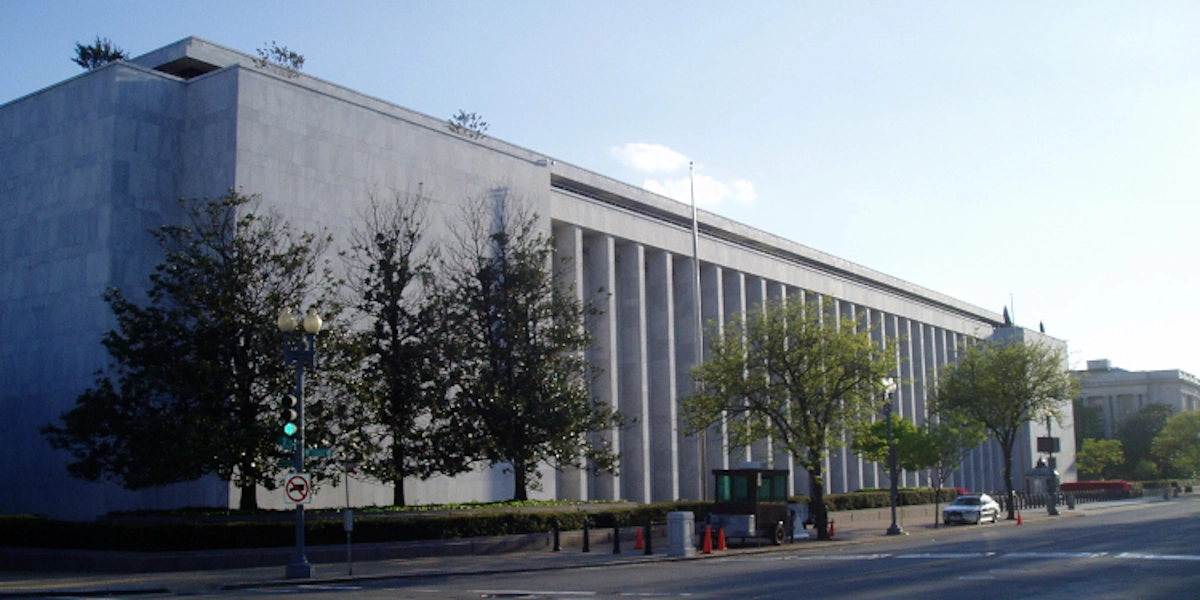
Washington, D.C.’s James Madison Memorial Building, which houses the U.S. Copyright Office.
American songwriters and publishers scored a hard-fought mechanical royalty rate increase from streaming music platforms in a late-breaking decision on Friday (July 1st). But not every concession was granted.
Earlier this week, Digital Music News first reported on rumblings of the pending increase. Now, it’s official: according to details disseminated by the Copyright Royalty Board (CRB) late on Friday, July 1st, streaming music platforms like Spotify, Apple Music, YouTube Music, and Amazon Music Unlimited will be forced to pay substantially more to music publishers and songwriters in the United States. Specifically, the determination covers the 2018-2022 period — covered by the ‘Phonorecords III’ proceeding — and involves a 43.8% increase in pre-2018 mechanical royalty rate requirements.
Specifically, the ruling moves the mechanical royalty rate owed by streaming music services to 15.1%, up from 10.5% previously for the four-year period spanning 2018-2022. The ruling itself was first issued in 2018 by the Copyright Royalty Board, though streaming giants Spotify, Amazon Music, and YouTube (via Google), among others, fought to maintain the 10.5% rate (Apple notably did not protest the increase). The ruling means that streaming platforms will be forced to not only increase their mechanical royalty payments, but also retroactively pay increased royalty amounts starting in 2018.
That amounts to a considerable tranche of cash, and explains why streaming services had previously requested that payment obligations be delayed. It’s unclear if those requests have been granted or are under consideration, though National Music Publishers’ Association president David Israelite noted that back payments would be pursued immediately.
“This process was protracted and expensive and though we are relieved with the outcome, years of litigation to uphold a rate increase we spent years fighting for is a broken system,” Israelite stated to Digital Music News. “Now, songwriters and music publishers finally can be made whole and receive the rightful royalty rates from streaming services that they should’ve been paid years ago. We will work to ensure that the services quickly backpay copyright owners as they are required by law.”
The increase is a substantial blow to streaming music platforms, a group that pays a very hefty percentage of revenues back to rights owners. That includes publishers and songwriters, though recording labels command the lion’s share of royalties on streaming. The reasons for the imbalance are complex and rooted in heavy government regulation of publishing royalties.
Just recently, Israelite revealed that labels soaked up 58.6 percent of streaming royalty revenues in 2021. That figure leaves a smaller sliver for underlying compositions (i.e., publishing IP).
“We now have, for the first time, a treasure trove of information that has never before been made public until now,” Israelite told attendees at an NMPA annual get-together in New York in June. “There are 47 different music services that operate 151 different models that pay mechanical royalties to songwriters. We now know that in 2021, those services combined generated nearly $9.8 billion in revenue, which is just one of the important factors by which songwriters get paid.”
“The vast majority of those royalties, over 96 percent, come from the same five companies that are fighting to cut songwriter rates in the CRB process: Amazon, Spotify, Apple, Google, and Pandora. We also now know that those services paid record labels $5.7 billion in 2021, 58.6 percent of the revenue pool – significantly higher than the 52 percent that is often reported,” stated Israelite.
It’s unclear why Israelite stated that Apple was fighting to reduce mechanical royalty rates. That may have been an error — Apple has not contested the CRB’s 2018 ruling.
Adding to the complexity is an ownership structure that frequently results in publishing rights controlled by major music label conglomerates (mostly principally Warner Music Group, Sony Music Entertainment, and Universal Music Group). Major label ownership of vast portions of publishing rights: Universal Music Group, for example, is not only a recording label, but also the umbrella organization over Universal Music Publishing Group, which controls massive amounts of compositional rights.
That point hasn’t been lost on streaming music platforms. Immediately following the decision, the Digital Media Association, DiMA, which represents streaming music platforms, raised the issue of major label payment imbalances.
“Today’s decision comes as the three major label groups – which operate the world’s three largest music publishers – continue to earn the lion’s share of the industry profits while reporting consistent double-digit revenue growth as a result of streaming,” DiMA president and CEO Garrett Levin relayed in a statement.
“Looking ahead, streaming services believe it’s time for all stakeholders — labels, publishers, writers, artists and the services — to engage in comprehensive discussions to figure out the right royalty-sharing balance going forward.”

